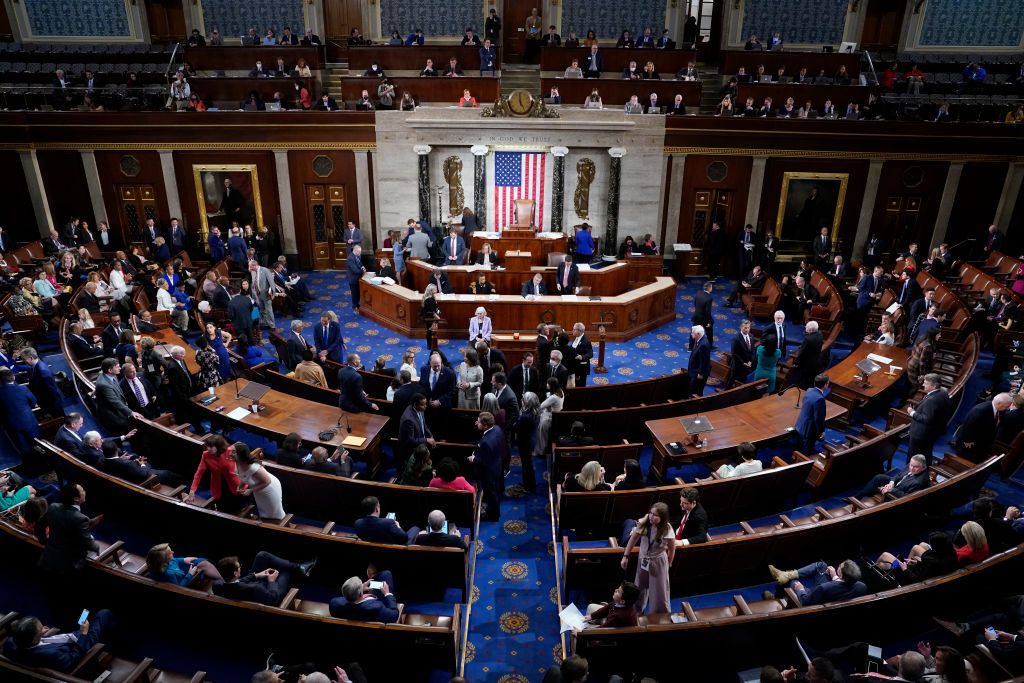How many amendments can House lawmakers propose for a three-page bill? At least 143.
As debt ceiling talks look to drag out for months, the House is proceeding with messaging bills and forming committees. For the first time in about seven years, the House is debating legislation this week under rules that allow all members to introduce amendments to a bill without being pre-screened and approved for floor consideration by leadership—so long as they submitted the amendments to the Congressional Record at least a day before debate kicked off.
We’ve written to you repeatedly in the past month about how the House will have a more open legislative process—at least for now—with the start of this Congress. Now, with this “modified open rule,” we’re seeing it play out.
The legislation under consideration would limit presidential power to release oil from the nation’s Strategic Petroleum Reserve, moves President Joe Biden has relied on since Russia invaded Ukraine last year. The bill also aims to open more federal land to be leased for oil and gas drilling.
Members debated a couple dozen amendments on Thursday night, and they’re debating more this morning. You can keep track here of which have received votes or are waiting for consideration, and which have passed, failed, or were ruled out of order.
A sampling from Thursday night: GOP Reps. Matt Gaetz of Florida and Nancy Mace of South Carolina secured amendments ensuring the bill will not affect existing prohibitions on drilling offshore from their states. An amendment from Rep. Lauren Boebert that passed narrowly would increase the legislation’s allowable percentage of federal lands leased for oil and gas from 10 percent to 15 percent.
And an amendment from Democratic Rep. Josh Gottheimer passed overwhelmingly with a vote of 419-13. It would ban sales from the Strategic Petroleum Reserve that would benefit entities owned, controlled by, or contracting with China, North Korea, Russia, and Iran.
One amendment that failed miserably: Rep. Marjorie Taylor Greene’s to effectively bar all Strategic Petroleum Reserve drawdowns until more federal land is leased for oil and gas, even during severe energy supply interruptions. It received only 14 votes in favor and 418 votes against. (GOP Rep. Pete Sessions noted the amendment’s stark failure to Politico and said the open process may be a way to, over time, “lessen the stupidity factor.”)
Republican leaders have touted the more freewheeling process as a fulfillment of promises to the American public and lawmakers from both parties.
“There will be more openness, more opportunity for ideas to win at the end of the day,” House Speaker Kevin McCarthy said.
Whether lawmakers will have the fortitude to continue taking difficult amendment votes remains to be seen.
Matt Glassman, a senior fellow at Georgetown University’s Government Affairs Institute, said that an open process may be “normatively good,” but it can pretty quickly get bogged down with partisan point-scoring. That’s why he doesn’t expect this kind of process to survive the entire Congress.
“Eventually, minority amendments forcing tough votes will wear thin,” he wrote.
Keeping Communists Off U.S. Farms
Republican leaders this week announced members of the newly formed select committee on strategic competition with the Chinese Communist Party (CCP). One of them, Rep. Dan Newhouse of Washington, an agricultural scientist, spoke with The Dispatch in an interview Thursday about his priorities for the panel. Here are the highlights, edited for clarity and length.
Haley: Why did you want to join the panel?
Newhouse: The subject of China has been on my radar screen for several years, particularly around the area of preventing the CCP from buying United States agricultural assets … It seemed like a natural extension of my time and effort to be a part of this effort.
How did you convince GOP leaders to choose you for it?
I don’t know that I did anything in particular to convince leadership other than to explain my interest and the history and the work that I’ve done. My assumption is they saw that as a valuable contribution to the overall effort of the select committee. I’m admittedly not an expert on some of the other aspects that we’re probably looking at, and I think other members of the committee would say they don’t know a heck of a lot about agricultural assets and the CCP. I bring a unique focus to the committee that others aren’t.
Why should people care about foreign-owned agricultural land, considering it is reportedly about 3 percent of privately held agricultural land in the United States, and only a smaller subset of that is connected to China?
The raw numbers would show that oh, they’re not really a big player compared to Canada or Mexico or many other countries in the world. But if you look at the trends over the last decades, certainly over the last 10 years, their acquisition of agricultural lands has increased by a factor of 10. And if you look at some of the things that they’re doing in countries around the world, there’s a concerted effort and a definite strategy on the part of the CCP to expand their control and influence in many different economic sectors. That is very concerning, and we don’t want to see that trend continue here in the United States.
The resolution setting up the committee passed with a lot of bipartisan support. But some Democratic lawmakers are concerned the committee could fuel anti-Asian discrimination. Is that something you’re thinking about as you prepare to join the panel?
That is not the intention, nor do I believe it’s a valid concern. We’re not focused on the Chinese people. We’re focused on the Communist Party of China. In fact, we’re very, very clear about that. And even in the name of the select committee, we’re very clear about that. We’ve made efforts in my legislation that I’ve been working on over the last few years to make that distinction. We’re not contributing to any kind of negative rhetoric towards any people in particular, only to the Communist Party.
None of us want to wake up five years, 10 years, 20 years from now, and think that we should have done something to prevent a situation where, in the case of agricultural assets, a foreign country who is not an ally controls a large part of our supply chain for food. That is an area of national security, and we want to avoid being in that position.






Please note that we at The Dispatch hold ourselves, our work, and our commenters to a higher standard than other places on the internet. We welcome comments that foster genuine debate or discussion—including comments critical of us or our work—but responses that include ad hominem attacks on fellow Dispatch members or are intended to stoke fear and anger may be moderated.
With your membership, you only have the ability to comment on The Morning Dispatch articles. Consider upgrading to join the conversation everywhere.